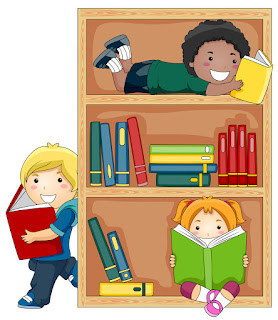Today a word about school librarians and how important they are to the goal of bringing literacy to children. I suppose first of all we need to deal with the nomenclature issue. Today it is more accurate and politically correct to call these very special folks "media specialists." Certainly the job of the librarian has grown over the years, so that librarians are now expected to be what Howard Stern used to call himself, "The King of All Media." But I confess I have a soft spot in my heart for the term "librarian", which evokes for me lazy afternoons dawdling in the stacks looking for another short novel by Steinbeck or historical parody by Richard Armour or picture history of World War II with a librarian often leading the way. So for me it is librarian and I hope no media specialists out there are offended.
I learned very early in my teaching career that the school librarian could be the teacher's best friend. I was teaching at Bristol Junior-Senior High School in Pennsylvania and had been charged with taking my freshly minted Master's degree in literacy, which the school district had helped pay for, and starting a brand new "developmental reading" program for the seventh grade. To start the program, the district gave me the princely sum of $400. I took my purchase order and my own list and went down to the school library to talk to Hilda Ben Ezra, school librarian.
Hilda was one of the more remarkable people I have ever met and she is the model I have used over the years of what a great school librarian should be. Hilda had a degree in chemistry from Penn State and a masters in library science from Drexel University. She was as well read a person as I had ever met and she loved to talk books and issues of social justice - two of my favorite subjects. We hit it off and became friends.
Now I needed a well-informed ally and friend to help me start my classroom library collection. I was determined that my studnets would be surrounded by great young adult literature in their reading classroom. I was convinced that to create lifelong readers my kids needed to be surrounded with good books to read right in the room. Hilda knew more about young adult literature than anyone I knew and so we teamed up.
Needless to say, we ran through the $400 very quickly and I was well aware that my classroom library was going to be pretty sparse for my student population of 130. Hilda said, "I have a plan." I can hear Hilda's proposal in my ear now as I write this more than 35 years later. "Russ, I have more books to read and review than I can possibly get to. How about if you help me out by reading some of them and competing review forms and I will help you out by creating a branch lending library in your classroom."
And that is what we did. Each month I would supply Hilda with the theme I would focus on in class that month (tolerance, survival, coming of age, historical fiction) and she would pull a cart full of relevant and appropriate titles for my seventh graders. We worked out a system for tracking the books children borrowed and I agreed to be responsible for them. As a bonus, I got to read and review a bunch of new books and my own knowledge of young adult literature grew.
If the truth be known, our system of tracking books did not work so well and more than a few were lost, but both Hilda nad I took solace in knowing the books had likely found a good home. Most importantly, lots of kids who had never considered themselves readers began to read.
Over the years I taught at many levels and I always tried to use versions of this model as a way to supplement my classroom libraries. Unfailingly I found the school librarians I worked with to be knowledgable and supportive. I never did get better at tracking the books, however.
Once I moved into adminsitration, I had the great good honor of supervising the librarians in my school district. Again I found people who were passionate about books and kids and about kids reading books. With these folks we opened four new school libraries, divied up the holdings of older libraries to new schools and libraries, transformed from card catologues to online data bases and continued to try to get books into kids hands.
And yet with all the good and important work that school librarians do, they are an endangered species. The Great Recession and the fallout from the test-based accountability mania that is dominating the narrative in many schools has differentially impacted librarians.The numbers of lay-offs of school librarians has far exceeded the lay-offs of classroom teaching personnel. School libraries are being closed, full-time staffing of school libraries is being reduced to part-time. Clusters of elementary schools are being forced to share one librarian.
Any person that has an ounce of knowledge about children, learning and literacy knows that this is short-sighted. A well-stocked, well-managed school library, appropriately staffed with professional librarians will have a greater impact on student literacy in the school than any standardized test. The school librarian is central to the mission of any school. They need our support.
For all those classroom teachers out there, I recommend that you be sure to make a friend of your school librarian. The relationship will make a world of difference in your teaching and in your students' learning.

No comments:
Post a Comment